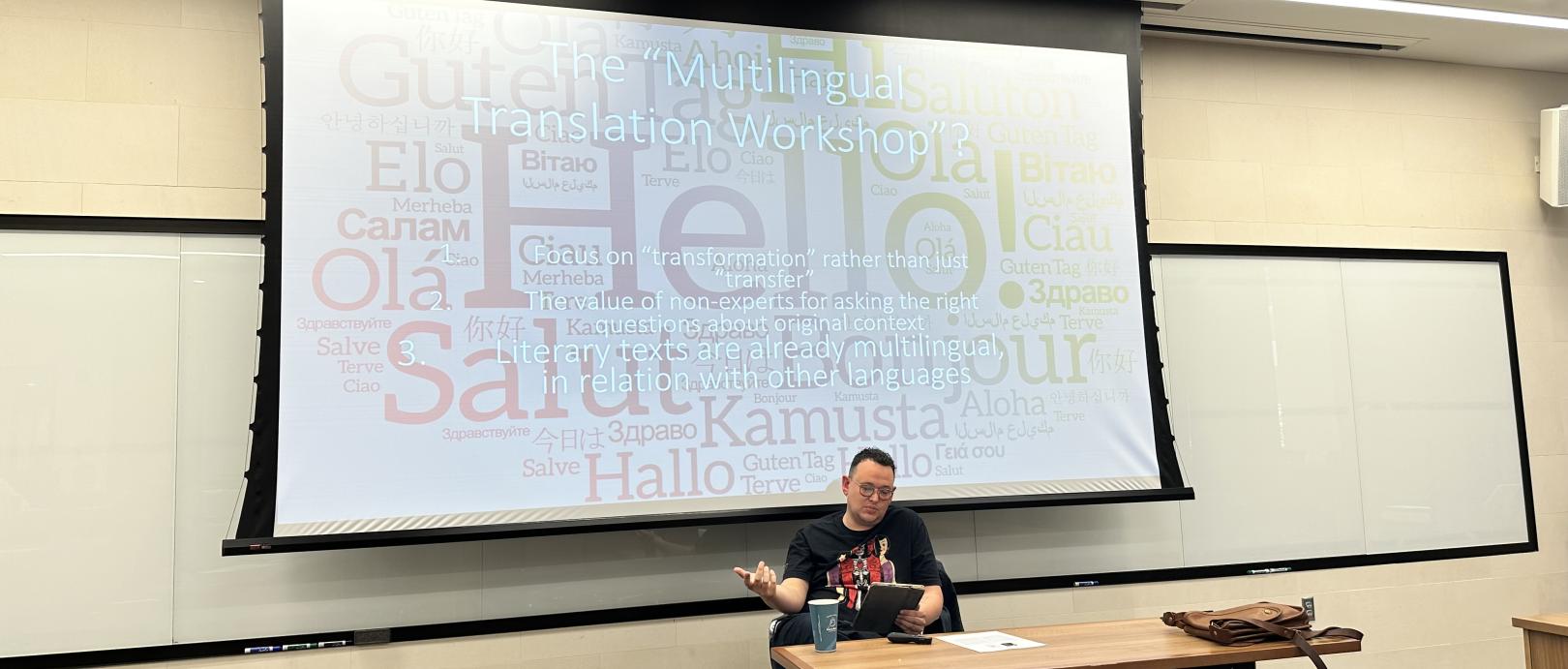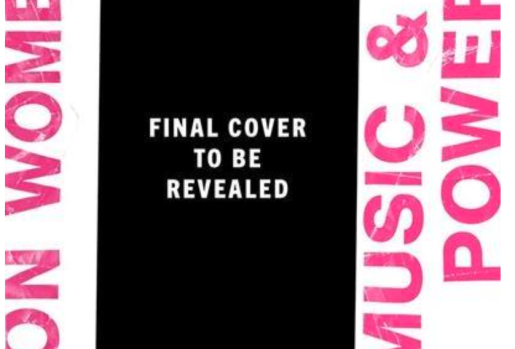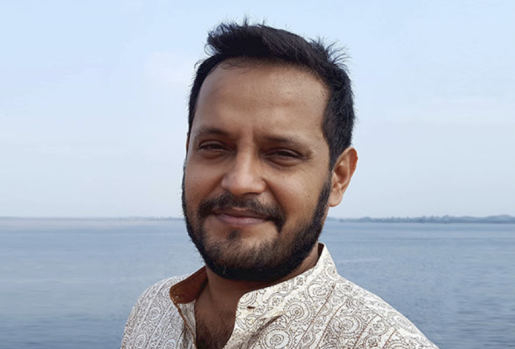MFA in Creative Writing
This is Europe’s only two-year, interdisciplinary graduate program in creative writing. Students are taught to hone their craft across multiple genres, languages, and cultural traditions, so they can tell their stories in the ways they need to be told. And did we mention we’re in Paris?

The MFA in Creative Writing at The American University of Paris has a global focus. Students engage with writers from all over the world and read both works in translation from multiple languages and contemporary and classic works in English. Our students move beyond the boundaries of genre and form into new realms of self-expression.
In addition to workshops in Fiction, Poetry, and Creative Nonfiction, they take a “hybrid” workshop, usually in their first semester. The themed focus of the hybrid workshop gives students the chance to dive into the practice and politics of literary translation, eco-poetics, or writing in conversation with the visual arts. Our goal is to help students understand how their practice fits into wider, global perspectives. And we welcome students from all backgrounds, including mature students with strong portfolios, regardless of their previous academic pursuits.
Master of Fine Arts in Creative Writing
- Duration 4 Semesters
- Entry time Fall
- Tuition and Fees €55,296
- Language English
-
A Global Curriculum
Our curriculum encourages students to challenge traditional divisions between fiction and poetry in order to tell stories in innovative ways. Courses in world literature and translation, whether they assign translations from Arabic or poems from Francophone West Africa, offer students a global, international perspective on literature and what it can do.
Program Learning Outcomes:
- Create a book-length body of work in a particular genre, or between genres, and be able to situate one’s own writing relative to one or more literary lineages.
- Demonstrate an international understanding of the evolution of genre, including mastery of classic and contemporary texts, techniques, and possibilities in one genre, familiarity with contemporary works in another genre, and an understanding on how genre differs across languages and cultures through translation.
- Show fluency on creating composite or “hybrid” forms by blending genre and/or media /visual art in the production of prose or poetry and/or by creating work that is informed by the specificity of one’s special environment, the city of Paris.
- Demonstrate a command of the many aspects of publication across different geographies, from big name publishing houses to independent small presses: this includes being able to give effective feedback on creative work, edit oneself and others, and explore digital work and international collaborations.
The focus is on storytelling—you will be trained in any genre your story needs to be told in.

– Biswamit Dwibedy, Co-Director of the MFA in Creative Writing We encourage students to address international concerns, and to engage creatively with contemporary issues such as climate change, social justice, and migration.
This scholarship is enriched by having access to AUP’s research centers. These mission-driven centers promote exchange on subjects the University community values: writing and translation, democracy and social justice, genocide prevention and human rights, critical media studies, and the environment.

Featured Course: The Paris Seminar
Paris is famous for its writers: not only did it inspire the greats of modernism, but it is home to some of today’s most exciting contemporary writers, poets, performers, and artists. Taken in the first semester of the MFA, The Paris Seminar serves as an introduction to graduate studies in creative writing and provides a framework through which students engage with the city of Paris, its history, its creative communities, its archives, libraries, exhibition spaces, and bookstores. Presentations by faculty members from the department of Comparative Literature, English, and Creative Writing will be complemented by talks by a range of Paris-based writers.
One goal is to explore how the practice of translation—and knowledge of its politics—can inform and enrich one’s own writing.

– Amanda Dennis, Co-Director of the MFA in Creative Writing A Vibrant Literary Community
We’re a new program with established roots—not only has Paris harbored a rich literary and artistic tradition for centuries, but AUP has, since 2007 been home to the Center for Writers & Translators (CWT), an innovative research center that publishes the Cahiers Series. Each of the more than 40 volumes of the series juxtaposes original writing that relates to cultural translation with works by visual artists. Contributors include Anne Carson, Lydia Davis, Gao Xingjian, and Javier Marias.
Since completing his work as one of the editors of the four-volume Letters of Samuel Beckett, Professor Dan Gunn, who is Director of AUP’s Center for Writers & Translators and teaches on the MFA, has been working with students on preparing an edition of a two-volume Letters of Muriel Spark.
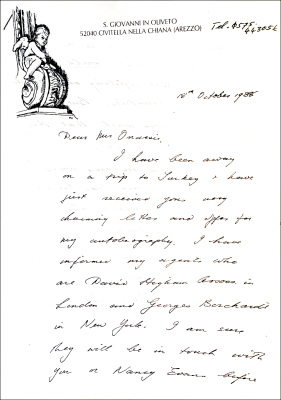
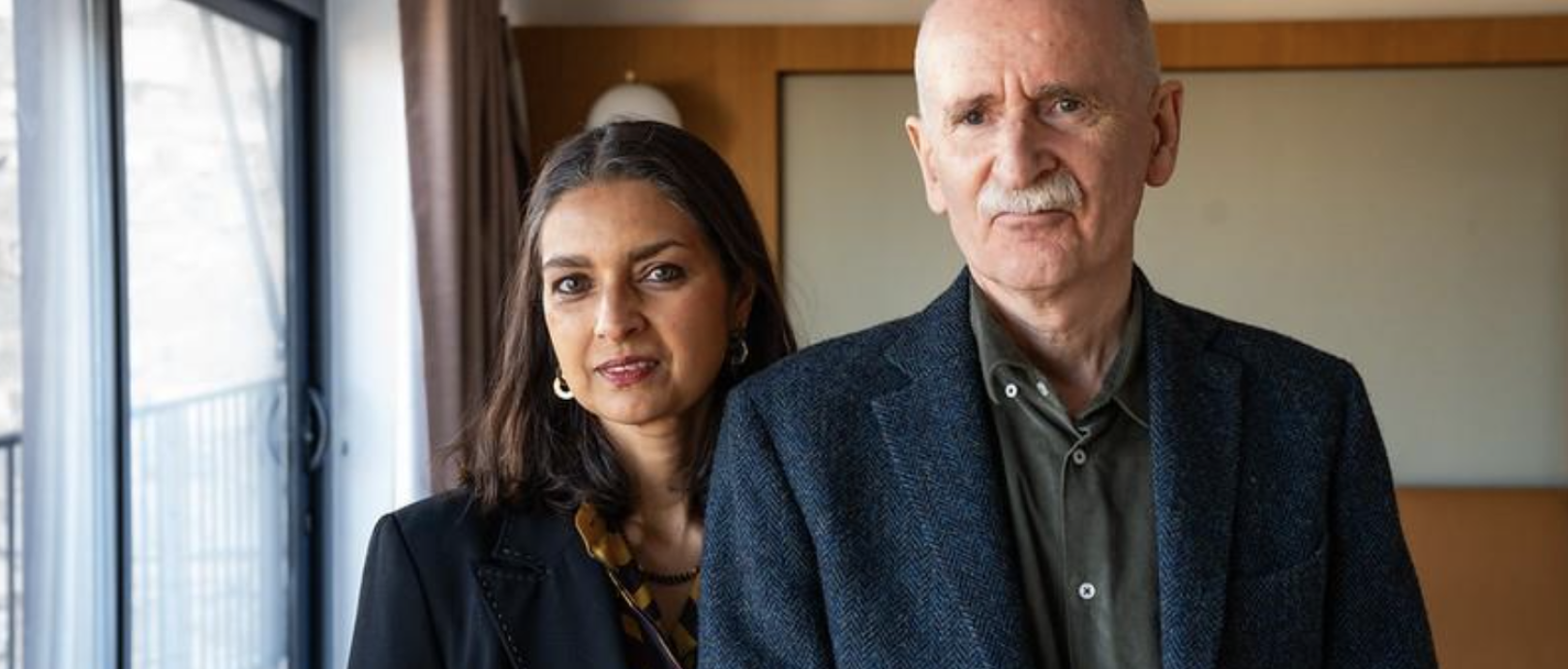
Jhumpa Lahiri and Biswamit Dwibedy
Celebrated author sits down with MFA professor for a conversation on truth, translation, and circling the silence.
#446CCF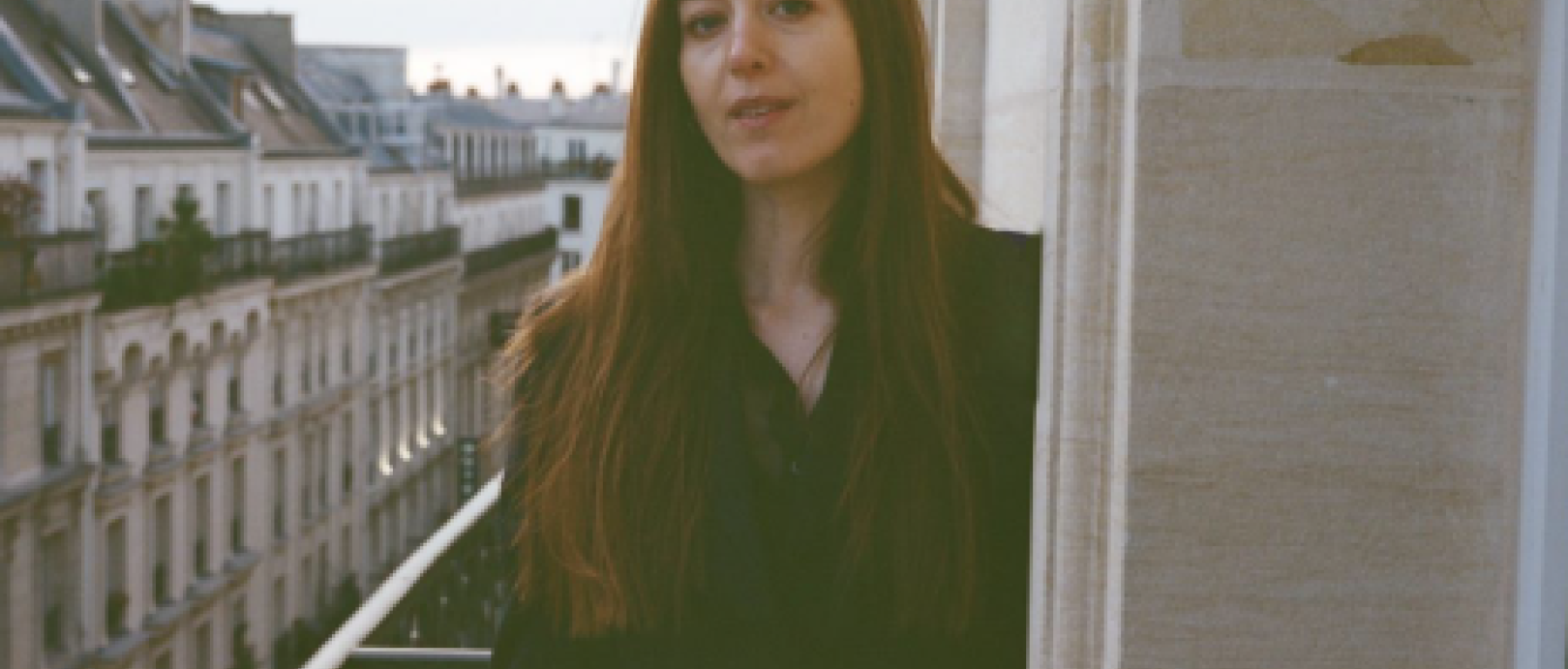
In Conversation with Alice Blackhurst and Brendan Dentino
After an inspiring semester in Paris, AUP's Writer in Residence Alice Blackhurst and MFA student Brendan Dentino discuss the power of an MFA program.
#446CCF…That Extends Into the City
Today, Paris is a living and forward-looking center of arts and culture. Our program evolves in response to the writers and thinkers currently in Paris, placing students at the heart of a diverse, thriving creative community. On a typical day, a student might hone their craft in the same cafés as Jean Rhys and Ernest Hemingway, before spending the evening enjoying a live reading by a contemporary writer such as Lauren Elkin or Yoko Tawada.
A master class with a Pulitzer-winning poet at AUP might be followed by an author discussion at the legendary Shakespeare and Company bookshop or a book launch at The Red Wheelbarrow. An AUP seminar on Queer Theory or Digital Poetics could inspire participation in one of the open mic nights and poetry slams that are part of the city’s thriving spoken-word culture.

Josephine Baker Symposium
The many avatars of Josephine Baker are still being celebrated today, whether at the Pantheon in Paris, or AUP.
#273B8B
Evening with an Author
AUP’s Center for Writers and Translators (CWT) and the American Library in Paris co-hosted an event with New York–based writer Joshua Cohen.
#273B8BPartnerships
International conferences held at AUP and the MFA’s partnerships with Parisian literary institutions provide students with access to world-class scholars and writers and with internship opportunities at a range of cultural institutions such as:
- The Center for Writers and Translators
- The Irish Cultural Center
- The American Library in Paris
- The Red Wheelbarrow
- Shakespeare & Company
These partnerships enable us to offer opportunities for students to contribute to the life of professional literary communities. We are committed to evolving the program over time, establishing new exciting partnerships as students’ academic and literary interests change. As a new program we are constantly building partnerships with institutions, literary agents, museums, publishing houses and authors in France and around the world.
Structure
Fall 1 Spring 1 Fall 2 Spring 2 1 Workshop 1 Workshop 1 Workshop 1 Workshop 1 Seminar 1 Seminar 1 Seminar MFA Thesis 2 Modules 2 Modules Fieldwork
or
Internship
or
2 Modules12 credits 12 credits 12 credits 12 credits Required GPA
Graduate students must maintain a cumulative grade point average (GPA) of 3.00. Students with a GPA of less than 3.00 will be placed on probation. Only two grades of C (or C+) may be counted towards an M.A. degree. Students do not earn credit for grades below C.
Graduation
Graduates of the program join the University’s annual Commencement Ceremony in the beautiful Théâtre du Châtelet.

-
Experiential Learning
The cross-genre, border-spanning nature of our curriculum lends itself well to international experiential learning. We combine opportunities for focused writing time—such as our three-day writer’s retreat to Royaumont Abbey—with visits to archives, publishing houses and institutions around the world, where students hear from writers pushing the boundaries of form while working across cultures and disciplines. Faculty in the department have recently led study trips to Iceland, London, Bordeaux, Crete, and Cairo.
India
Indian Literary PracticumOur flagship fieldwork trip sees students travelling to cities across India to meet with the agents, editors, writers, translators and poets of the country’s thriving literary scene.

France
Royaumont Writer's RetreatWhat would a creative writing program in France be without a writing retreat at a 13th century abbey?

-
Faculty
Student–faculty interaction is the core of our program, and graduate students regularly collaborate with their professors on research or editing projects. Our small class sizes and hybrid workshops mean individualized care and attention—and a strong faculty drive to work with students.
We offer classes on Marcel Proust, Emily Dickinson, and Samuel Beckett—allowing faculty to teach their passions and transfer that energy into the classroom. We also offer opportunities to write across disciplines and take courses from other graduate programs, so students can benefit from faculty across AUP who specialize in environmental science, postcolonial theory, bookmaking, branding, or food studies.
Faculty Spotlights

Amanda Dennis
Professor and author Amanda Dennis shares insights into her first novel, Her Here.
#E30022
Daniel Gunn
Professor Daniel Gunn runs AUP’s Center for Writers & Translators with colleague Daniel Medin
#E30022
Geoffrey Gilbert
Literature and creative writing are investigative, experimental and embodied practices.
#E30022Faculty Publications
As well as being teachers and mentors, the creative writing faculty are passionate and active practitioners in the fields of writing, editing, researching and translation. Below are selected highlights of their work.
Amanda Dennis's most recent publications are Her Here (Bellevue Literary Press, 2021), “A Terrible Beauty: On Fernanda Melchor’s Hurricane Season” in the LA Review of Books (2020) and “Tuning Out to Tune In” (published as “Questioning is Political”) in Guernica (2018).
Biswamit Dwibedy’s most recent books are MC3 (Essay Press, 2018), Hubble Gardener (Spuyten Duyvil, 2018), and Ancient Guest (HarperCollins, 2017).
Geoffrey Gilbert's first book, Before Modernism Was: Modern History and the Constituency of Writing, was published by Palgrave-Macmillan in 2004. Recent publications include 'Marginal Pleasures and the Curve of Indifference: The Value of Pleasure in Late Henry James’ in Revue Française d’études américaines 167 (2021) and ‘The Durability of Affect and the Ageing of Gay Male Queer Theory. Affect and Literature' in the Cambridge Critical Concepts series (2020).
Daniel Gunn is the Paris director of the correspondence of Samuel Beckett, an international project based in Emory University. The publication of the fourth and final volume in 2019 was the result of two decades of scholarship and hard work, both by the editors and student interns. Over sixty AUP students have worked as interns over the course of the project. Learn more about the project here.
Affiliate or Visiting Faculty
The MFA classroom is further enriched by welcoming guest lecturers from AUP and beyond.

Andrea Applebee was raised outside of Charleston, South Carolina. She received her BA in English from Davidson College, and an MFA in nonfiction, as well as a certificate in Rhetoric and Composition from the University of Pittsburgh. She taught critical writing at the Universities of Pennsylvania and Duke, where she also instructed in the Center for Documentary Studies. Her teaching interests included documentary poetics, writing about photographs, and intersections between art and philosophy. Andrea moved to Athens, Greece, in 2016 with her guide dog Mercy. She works there as a freelance editor. Her first collection of poems, Aletheia (Black Square Editions) was published in 2017. She has a forthcoming book of poems, Anemones, with Magra Press.

Daniel Levin Becker is a critic, editor, and translator from Chicago. He is the youngest member of the Parisian literary collective Oulipo, and the author of Many Subtle Channels: In Praise of Potential Literature (Harvard UP, 2012) and What’s Good: Notes on Rap and Language (City Lights, 2022). His recent translations include Jakuta Alikavazovic’s Like a Sky Inside (Fern, 2024), Éric Chevillard’s Museum Visits (Yale UP, 2024), and Laurent Mauvignier’s The Birthday Party (Fitzcarraldo/Transit, 2023), which was longlisted for the International Booker Prize. A longtime contributing editor to The Believer magazine and senior editor at McSweeney’s Publishing, he is currently co-director of Fern Books and English editor for the French non-fiction publisher Odile Jacob. He lives in Paris.

Sylvia Brownrigg is the author of six books of fiction, including the novels Pages for You and The Delivery Room. Her work has been included on the NY Times Notable list and the LA Times Best Books of the Year. Her reviews have appeared in the NY Times, The Guardian, and the TLS, and she has taught at The American University of Paris. Her novel for children, Kepler’s Dream (published under the name Juliet Bell) has been turned into an independent feature film. She lives in Berkeley with her family, and continues to spend time in London. Read Sylvia Brownrigg's wonderful work in no.30 of the Cahier Series.

Rachel Cusk is the author of Second Place (Prix Femina étranger), the Outline trilogy, the memoirs A Life’s Work and Aftermath, and several other works of fiction and nonfiction, including her most recent novel Parade (Goldsmiths Prize, 2024). She is a Guggenheim Fellow, the recipient of the 2024 Malaparte Prize, and has been awarded the title of Chevalier de l'ordre des Arts et des Lettres. She lives in Paris. Photo credit: Siemon Scamell-Katz

Lauren Elkin is the author of several books, including Art Monsters: Unruly Bodies in Feminist Art and Flâneuse: Women Walk the City, which was a New York Times Notable Book of 2017 and a finalist for the PEN/Diamonstein-Spielvogel award for the art of the essay. Her first novel, Scaffolding, will be published in June 2024. Her essays have appeared in Granta, the London Review of Books, Harper's, Le Monde, and Frieze. An academic by training, she holds a PhD in English from the CUNY Graduate Center and the Université Paris Cité, and has taught literature and creative writing at New York University, the American University of Paris, the Université Paris Cité, and the University of Liverpool. She is also an award-winning translator, most recently of Simone de Beauvoir's previously-unpublished novel The Inseparables. After twenty years in Paris, she is now based in London.

Siemon Scamell-Katz is a contemporary painter. In attempting to make a record of a landscape, the ambition of the artist is to offer to the spectator a sensation of sharing the experience of being in that same landscape. As the painter, you can never see all that is in front of you, the whole process of seeing is estimation, very skilled estimation, of what is there. In that sense it is impossible to be a representative painter, you can only ever give an estimate of what is there. Rejecting realistic painting or photography as “a false record of experiential reality”, he has discarded everything representative and iconographic. Instead, he uses his knowledge of human vision to create non-figurative paintings that explore the experience of landscape in perception and memory “I wish to see without being seen”. He lives and works in France.

Nafkote Tamirat (she/her) is a novelist, short story writer, teacher, and translator. A graduate of Yale University and Columbia University, Nafkote studied translation at the Institut National des Langues et Civilisations Orientales, where she translated the Amharic-language play, Yekermo Sew by Tsegaye Gabre-Medhin, which was later performed by the Masrah Ensemble at the Triangles Festival-in-Progress in Beirut. Her first novel, The Parking Lot Attendant, was shortlisted for the Center for Fiction First Novel Prize and named a New York Times Notable Book of the Year. She’s currently working on her second novel, which is about the Ethiopian diaspora in the US, but also exiled giants living in time-loop prisons.
Advisory Board
- Sylvia Brownrigg
- JM Coetzee
- Alan Hollinghurst
- Laszlo Krasznahorkai
- Richard Pevear
- Yasmine Seale
- Cole Swenson
-
Careers
Over the last few years, new developments in technology and social media have underscored the importance of good storytelling in all industries. Which is exactly what our program does.
A graduating student will be well prepared to work both in teaching fields and as a writer, poet, novelist or translator—but they will be equally ready to act as an acquisitions editor for a publishing house; as a founder or editor at a small press or cultural magazine; or as a writer of cultural content for a gallery, museum or exhibition space.
The option to take a specialized thematic emphasis throughout the course, including courses from other AUP master’s programs, also allows students to transfer their creative skills to other fields by becoming, for example, an advertiser, science writer, or food-and-wine journalist.

Co-Translating Marguerite Duras
Olivia Baes ’13 and G’14 and Emma Ramadan G’14 bonded over a shared love of French author Marguerite Duras while studying at AUP. Their second published co-translation of Duras’s work, The Easy Life, achieved critical acclaim.
#273B8B
Mui Poopoksakul G'15
One alumna’s mission to bring Thai authors to an English audience.
#182757
Graduate Career Outcomes
Our community of over 20,000 graduate and undergraduate alumni continue to offer opportunities to connect and expand horizons no matter where students find themselves after graduation. Across all of AUP’s graduate programs, nine out of ten graduate alumni go on to work or further study within a year of graduation, and more than eight out of ten report an international element to their careers.
An education in literature and creative writing from AUP can take you into varied careers, as exemplified by some of our alumni:
- Author and New York Times culture writer Farah Nayeri
- Owner of Harriet's Bookshop in Philadelphia Jeannine Cook
- Paris-based freelance writer and translator Emily Monaco
- Journalist and Founder Dawn Booker
- Junior Writer and Editor at the OECD Development Centre Aditi Partha
- Story Editor at Universal Television Mira Z. Barnum
- Poet, freelance writer and Adjunct Professor Lauren Beatty
- Journalist and broadcaster Rebecca Anne Proctor
Career Support ServicesAUP’s Center for Academic, Career and Experiential Advising (ACE) supports graduate students in defining, planning and developing their career pathway both during their degree and following graduation.

-
Admissions
AUP’s graduate programs welcome applications from motivated, high-caliber individuals who feel they will thrive in AUP’s international and dynamic environment. When assessing applications, we take a holistic approach to identifying the next cohort of Graduate Global Explorers, considering education, experience and general fit with AUP values and curriculum. Students can pursue our innovative program in Paris on the MFA in Creative Writing in the Fall.
The MFA in Creative Writing welcomes applicants from all backgrounds regardless of their previous study, including mature students. We are particularly looking for students who can showcase a strong portfolio and have an interest in understanding how their practice fits into a wider, globally-minded perpsective.
Tuition and Scholarships
Depending on the length of your graduate program, the cost will vary. Find out more about tuition and costs for the MFA in Creative Writing.
AUP offers need- and merit-based scholarships to graduate students. In 2022, 67 percent of incoming graduate students received some kind of financial aid award, and the average award represented about 33 percent of tuition. The majority of our financial awards range from 25 percent to 50 percent of tuition.
Application Process
Our application process is simple and straightforward: students submit their information, send us their supporting documents, and receive their admission decision within three weeks.
- Poetry: 10-12 pages
- Prose (fiction or creative nonfiction): 30-40 pages
- TOEFL - Internet Based Test (ibT) minimum score: 101. To have your results sent directly to The American University of Paris, use our institutional code 0866.
- Cambridge English - Advanced, or Proficiency level, minimum score: 185.
- TOEIC - Listening and Reading, minimum score 910. To have your results sent directly to The American University of Paris, use our institutional code 0866.
- IELTS - Academic Option, minimum score 7.0.
- You have been living in Australia, Canada, Ireland, New Zealand, South Africa, the United Kingdom or the United States for at least two consecutive years and have recently studied in an all-English curriculum.
- You have studied for at least four years in an all-English curriculum in any other country, although we continue to reserve the right to request English test results from any applicant.
You can start your application process by creating an account on AUP’s Application Portal. You will be able to return to this page to finish and review your application prior to submission as often as you like.
Online Form
Each graduate program has its own application via the AUP Application Portal. You may only apply to one program.
The form will ask you to complete various details including contact details, background information and educational history. Your application will also require several supporting documents which can be uploaded directly in your online application in .pdf or .doc formats.
Transcripts
Please submit official transcripts covering all previous university coursework, including confirmation of an awarded bachelor’s degree or equivalent. All official documents must be submitted in English or French, or with a certified translation. It is recommended that Transcripts demonstrate a minimum 3.0 cumulative grade point average (or equivalent).
Personal Statement
In a concise statement (500-750 words), please describe for us what influences, life experiences, and aesthetic orientations have contributed to your writing practice and why you wish to pursue graduate study in creative writing. This is also an opportunity for you to bring the parts of your application together; how does the work you submitted for your portfolio relate to your current projects and goals?
Portfolio
Please submit in a single document (pdf for preference) a selection of your strongest creative work; if you are submitting sections of a longer work, a novel or memoir, for instance, feel free to include a brief synopsis to contextualize the excerpt/s. If you are submitting different pieces, please label them clearly (e.g. short story, cross-genre fictionalized memoir, etc.). Works can be in one or many/any genre.
Supplemental Essay
How do you see yourself and your work in the context of an interdisciplinary, multigenre program in Paris? Please use this space to provide us with additional information about your plans for future works and why Paris might be a good place to undertake such projects. (300 words)
CV / Resume
Applicants should submit a C.V. or resumé including university and/or employment history; community involvement; professional, and/or university extracurricular activities; and recognitions and achievements.
Letters of Recommendation
We require two letters of recommendation from individuals well-qualified to provide us with first-hand knowledge about your potential for graduate study, with at least one letter from a university professor if you graduated in the last five years.
Veteran & Military Applicants: One of your letters of recommendation should ideally come from a Commanding Officer.
When you have entered the contact details for your recommenders to your application, AUP will approach them for their recommendation.
English
Students must demonstrate sufficient fluency in English. If English is not your first language, we require you to submit results less than two years old from one of the following tests:
The English language test requirement is waived if you meet one of the following criteria:
We reserve the right to request English test results from any applicant.
When you have completed your application, you will be asked to review the application and confirm that you are satisfied with the application before final submission. There is a non-refundable €75 processing fee to be paid at this point.
When AUP has received all of the documents (including responses from your recommenders), the Admissions Committee will review your application. In some cases the committee may come back to you for additional information. A review takes approximately four weeks from when the final documents are received.
When the Admissions Committee has reached its decision, an email will be sent to the address provided asking you to log-on to the Application Portal to view the decision.
Deadlines
We review completed applications in rounds throughout the year. We encourage you to apply early: priority for admission and financial aid is given to those who apply in the earlier rounds.
Fall Admission
Review Rounds Application Round Deadline Priority Admission by February 1st Regular Admission by March 31st Late or International Regular admission after April 1st (based on available spaces) -
Requirements: MFA in Creative Writing (48 Credits)
Requirements and credit counts differ for the various Master’s programs at AUP. Please note that all requirements from previous years can be found in our archive catalogs.
Graduate students must maintain a cumulative grade point average (GPA) of 3.00. Students with a GPA of less than 3.00 will be placed on probation. Only two grades of C (or C+) may be counted towards an M.A. degree. Students do not earn credit for grades below C.
All courses carry four (4) credits unless otherwise noted.
Workshops (16 Credits)
Select four (4) courses for a total of 16 credits from the following list:
Course Code Course Name CW5000 Graduate Poetry Workshop CW5001 Graduate Translation Workshop CW5002 Graduate Fiction Workshop CW5003 Graduate Nonfiction Workshop: Crafting Personal Narratives CW5005 Hybrid Workshop Seminars (12 Credits)
Select three (3) courses for a total of 12 credits from the following list:
Course Code Course Name CW5004 The Paris Seminar CW5011 Emily Dickinson: Life and Afterlife CW5054 Gothic Fiction: The Literature of Excess CW5073 Ulysses, Modernism, Postmodernism, and Now CW5081 Postcolonial Literatures and Theory CW5083 Digital Poetics CW5085 Theory and Writing: Black Thought CW5091 Topics in Creative Writing Modules (8 Credits)
Select four (4) modules for a total of 8 credits:
Course Code Course Name CW5020MOD MFA Module Fieldwork or Internships (4 Credits)
Course Code Course Name CW5012 India Literary Practicum CW5098INT Internship Thesis Mentorship (8 Credits)
Course Code Course Name CW5095INPR Thesis
- Overview
- Experiential Learning
- Faculty
- Careers
- Admissions
- Requirements








